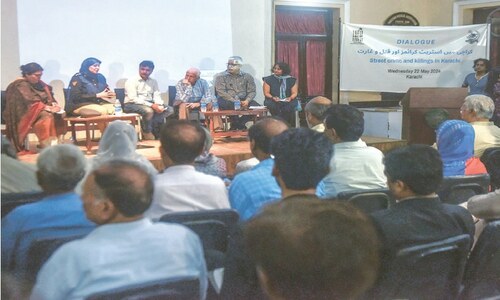GADANI: With no hope that they can take their vessels to the sea before noon, fishermen at a jetty in Gadani — a coastal town of Balochistan’s Lasbela district — engage themselves in different activities to spend time. One of them, Asghar Ali, helps a colleague weave a net for fishing.
“There is only one jetty in the town and that, too, has a flawed design as it stands on the shore instead of being built in the waters. This made us lose on the best time for catch since we have to wait for hours for the high tide that could help propel our boats to the sea,” he regrets.
Dozens of boats are anchored within the jetty as well as off the coast and one could see dried sections of the channel leading to the jetty, substantiating claims of locals that there hasn’t been any dredging in the channel for a long time.
The jetty and a road, according to the fishermen, are the only development projects the impoverished town has ever witnessed and that happened in 2000. The jetty became operational a few years later but the project of the harbour is still incomplete.
“Some fishermen prefer not to use the jetty but then you risk the vessel getting damaged by strong winds in this weather. Lack of dredging is also adding to fishermen woes,” says Mir Tawakul Baloch, an elderly resident and fisherman of Gadani. He adds that entrance to the jetty is particularly dangerous as its faulty design increases wave pressure and intensity. According to him, there have been incidents when boats overturned at this point and got broken.
“We had told them not to build a jetty here but they (government) didn’t listen to us. There was no scientific study either at the project’s conceptual stage. Consequently, we are still suffering, though the government spent billions of rupees on the jetty’s construction,” he says.
The ‘poorly conceived’ jetty is a major problem people face in Gadani — a fishermen’s town better known for its ship-breaking yard that is said to be the world’s third largest ship-breaking yard — besides lack of basic health and education facilities.
“We have to buy water brought here through tankers. There is no staff, equipment and medicine at the area hospital, while hundreds of workers are employed at the hazardous ship-breaking yard where workers daily suffer injuries and often lose life in emergencies,” says Rashid Ali representing a local non-governmental organisation, Global Organisation for Livelihood Development (Gold).
Expressing concern over the delay in harbour’s project, he says the entire revenue of Gadani goes to Karachi for local fishermen sell their catch at the Karachi fish harbour under the compulsion that Gadani lacked auction, processing and storage facilities.
“On top of that, illegal trawling from Sindh is making life of our fishermen difficult. The catch is depleting and illegal practices put additional burden on resources,” Mr Ali complains.
Also some fishermen believe that the project executors have disturbed the nature as its faulty design is leading to sea intrusion and forcing people to migrate.
Background interviews with various people show that there is little hope that the concerns relating to the jetty will be addressed any time soon as parties involved in the project have moved courts for different reasons.
Giving his side of the story, Balochistan Coastal Development Authority director general retired major Akbar Lashari says that fishermen are facing problems at the jetty only because it’s still incomplete and there is nothing wrong with its location that he says has been used as a landing site for centuries.
The government, he says, has so far spent Rs110 million on the project (that means the incomplete jetty which is only a component of an ambitious fish harbour project supposed to have facilities for auction and storage etc).
“Half of the work is still pending. The government couldn’t start the second phase of the project relating to the development of another backwaters channel for five to six years due to lack of funds. And, finally, it was decided that a private party should be involved for project’s execution,” Mr Lashari explains.
According to him, the project went well for more than two years with a private company and hit snags after the company suffered some internal dispute over its ownership. He explains that the government had signed an agreement with the company but later one of its top executives produced documents and informed the relevant officials that he bought all its shares. While the BCDA revised the agreement and signed it with him, other parties filed cases in court, Mr Lashari says, claiming that the BCDA had nothing to do with their dispute.
“We will try to complete the project from our own resources as soon as we get funds irrespective of the involvement of the private party,” he adds.














































Dear visitor, the comments section is undergoing an overhaul and will return soon.